
The best probiotics can do wonders for the body by supporting a healthy immune system, digestive health, and vaginal health.
Probiotics are bacteria (often referred to as “good bacteria”) that work to keep the community of microorganisms in the gut, and throughout the rest of the body, in a healthy, balanced state. While eating fiber-rich foods promotes the growth of the friendly bacteria, they can also be found in fermented foods like kimchi, kefir, tempeh, and sauerkraut. Yogurt is also a good source of the “good” bacteria. If you’re looking for a quick and easy way to get your probiotics in, supplements can deliver the bacteria in concentrated form.
Meet the Experts: Keri Gans, M.S., R.D., registered dietitian and author of The Small Change Diet; Frances Largeman-Roth, R.D.N., a New York City-based nutrition expert; Melissa Prest, D.C.N., R.D.N., national media spokesperson for the Academy of Nutrition and Dietetics and member of the Prevention Medical Review Board; Roshini Rajapaksa, M.D., a gastroenterologist with NYU Langone Health.
“The last several years have seen an explosion of research on the importance of the microbiome and the many health benefits associated with a balanced one. Probiotic supplements offer a way to help maintain this balance,” says Roshini Rajapaksa, M.D., a gastroenterologist with NYU Langone Health. They might serve as a sort of insurance supporting your overall health, particularly if you don’t eat a lot of fiber or fermented foods.
But you should manage your expectations: More research is necessary to make a call on probiotics for weight loss or probiotics for skin care, and the NIH hasn’t found conclusive evidence that they help conditions like asthma or urinary tract infections. “The research is evolving, so looking to probiotics as a ‘cure’ for a disease is probably premature,” Dr. Rajapaksa says. “If you’re looking to treat a medical condition it’s best to use probiotics under the guidance of your doctor.”
Our top picks
- BEST OVERALL PROBIOTICAlign Probiotic 24/7 Digestive SupportREAD MORE
- BEST VALUE PROBIOTICNewRhythm 20 Strain ProbioticsREAD MORE
- BEST PROBIOTIC FOR GUT HEALTHHUM Gut InstinctREAD MORE
Find all of our expert-recommended and reviewer-loved supplements that you can add to your routine below.
Dietary supplements are products intended to supplement the diet. They are not medicines and are not intended to treat, diagnose, mitigate, prevent, or cure diseases. Be cautious about taking dietary supplements if you are pregnant or nursing. Also, be careful about giving supplements to a child, unless recommended by their healthcare provider.
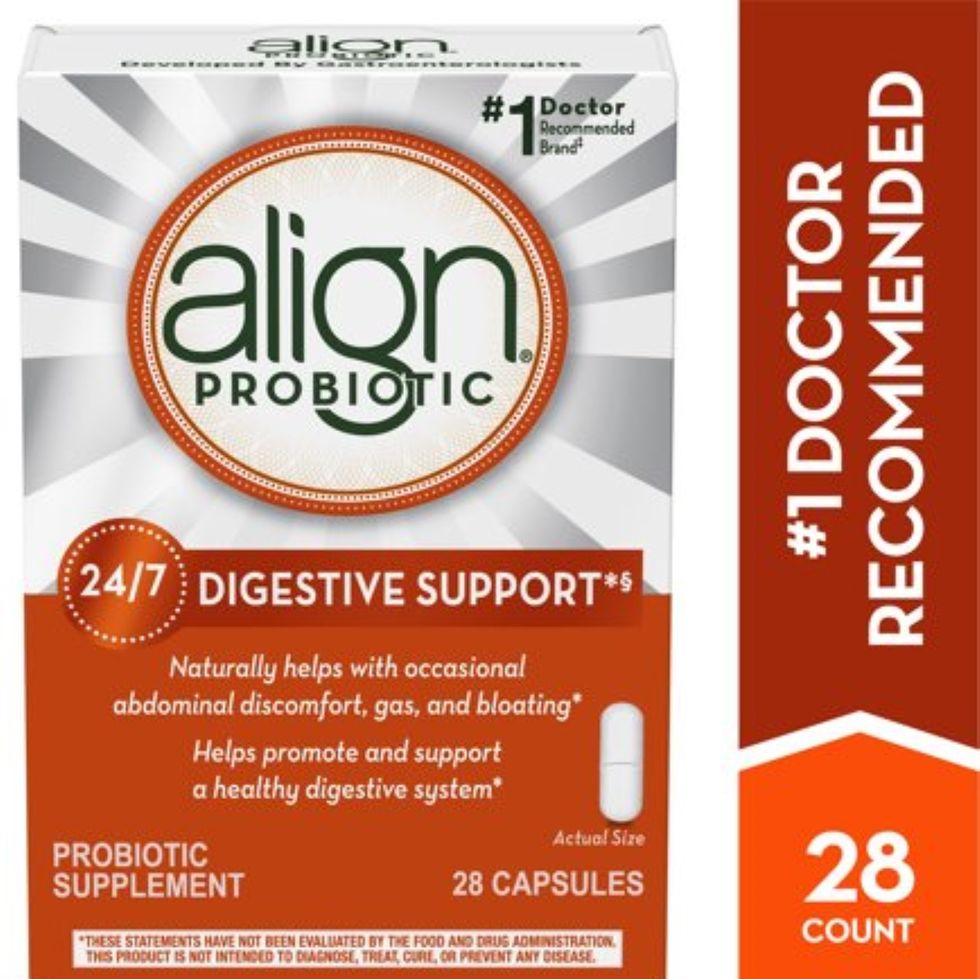
1
BEST OVERALL PROBIOTIC
Align Probiotic 24/7 Digestive Support
$72 AT WALMARTCREDIT: ALIGN
PROS
- #1 doctor and gastroenterologist recommended
- Gluten-free
- Soy-free
- Vegetarian
CONS
- Some reviewers said the packaging was bulky
This ever-popular probiotic supplement is a favorite among gastroenterologists thanks to strains like Bifidobacterium 35624, which supports healthy digestion and can help with occasional gas and bloating. It’s a well-studied probiotic for gut health, Dr. Rajapaksa says, and Amazon reviewers are big fans. “I no longer bloat and my bathroom problems totally disappeared,” one raves.
| Form | Capsule |
|---|---|
| Dose | 1 Capsule daily |
| CFU count | 1 billion |
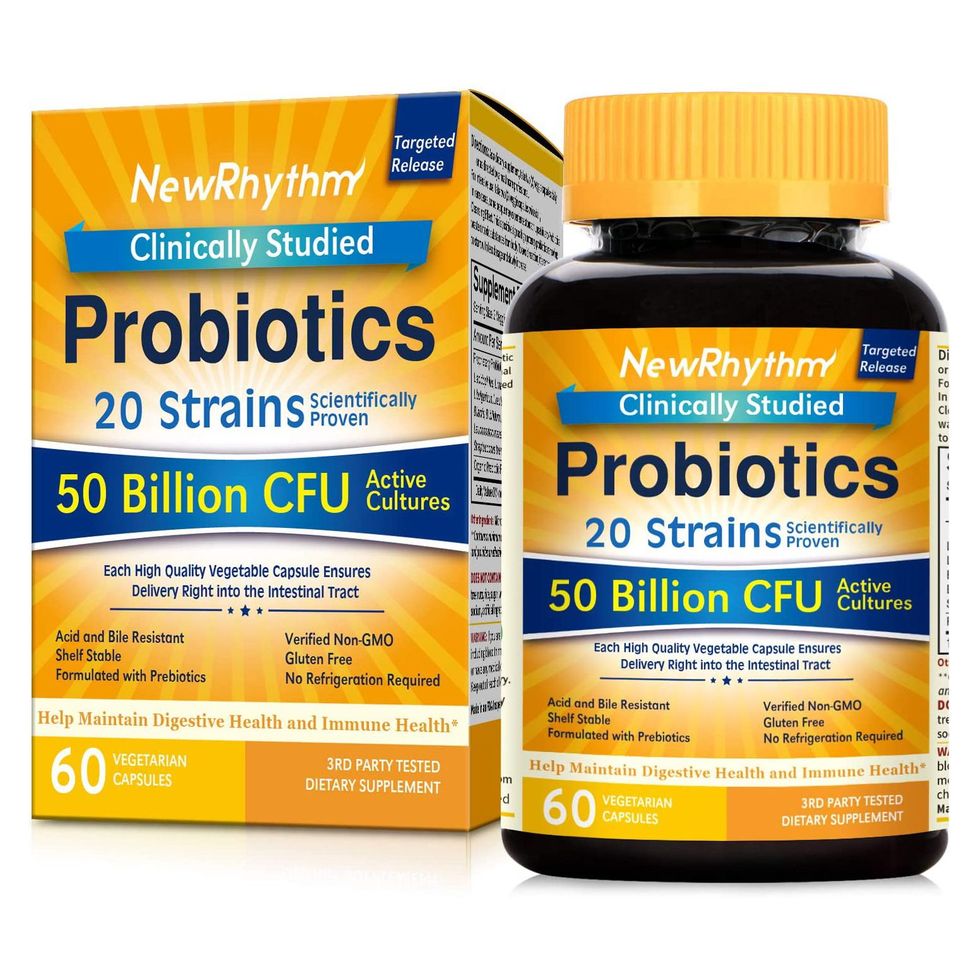
2
BEST VALUE PROBIOTIC
NewRhythm 20 Strain Probiotics
Now 23% Off
$17 AT AMAZON$25 AT WALMARTCREDIT: NEWRHYTHM
PROS
- Great value
- Targeted-release technology
- No refrigeration required
CONS
- 2 capsules per dose
With a unit price of just about a quarter per capsule, NewRhythm’s top-rated probiotic is one of the most affordable options on the market. But the brand doesn’t compromise on quality; each dose delivers 50 Billion CFU of 20 shelf-stable Bifidobacterium and Lactobacillus strains. “This product really changed my life,” explains one reviewer who experienced chronic diarrhea. “I don’t normally believe in a magic pill for ailments, but this has been just that for me.”
| Form | Capsule |
|---|---|
| Dose | 2 Capsules daily |
| CFU count | 50 billion |
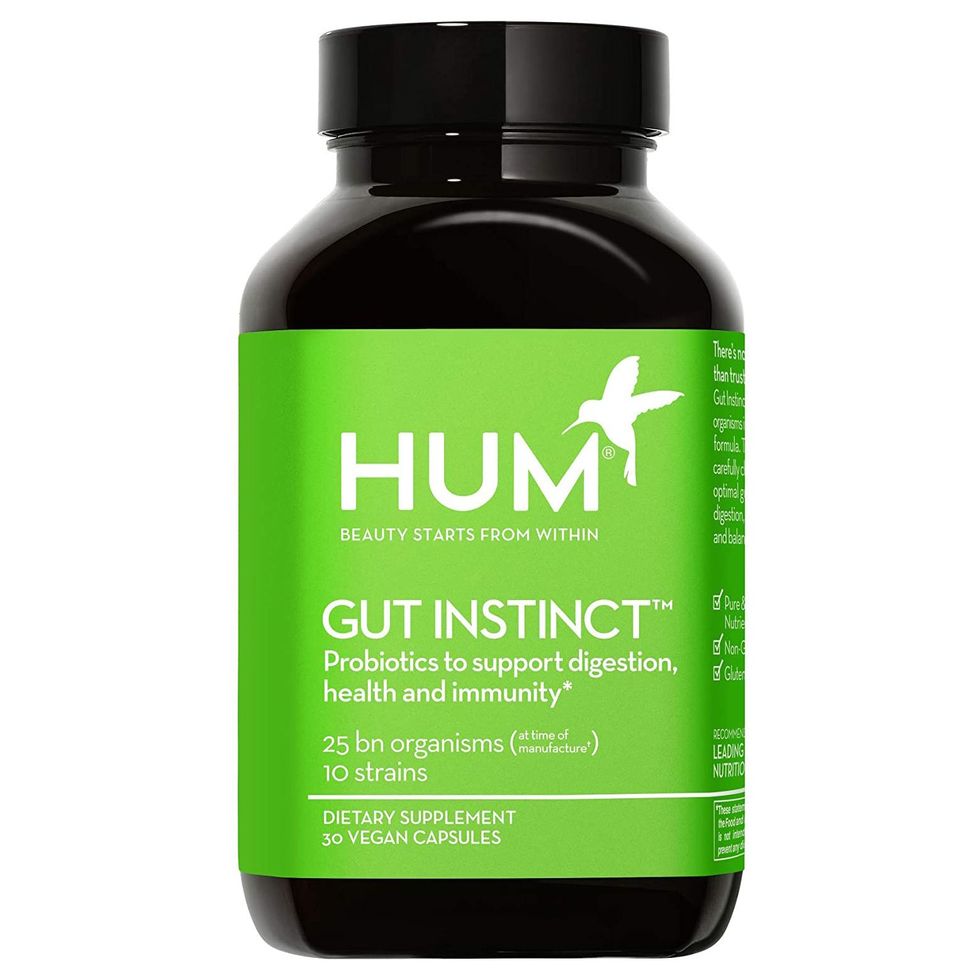
3
BEST PROBIOTIC FOR GUT HEALTH
HUM Gut Instinct
$26 AT AMAZON$26 AT NORDSTROM$26 AT NEIMAN MARCUSCREDIT: HUM
PROS
- Can take on an empty stomach
- Vegan
- Gluten-free
CONS
- Refrigeration required after opening
This option has 10 strains of Lactobacillus and Bifidobacterium, which have well-documented benefits. One is Lactobacillus rhamnosus, a bacteria that research suggests can be beneficial for diarrhea, mood support, and even weight loss. And unlike some probiotics, you can take it on an empty stomach. “I [live with] IBS/C and this product is truly a godsend,” one Amazon reviewer reports.
| Form | Capsule |
|---|---|
| Dose | 1 Capsule daily |
| CFU count | 25 billion |
Advertisement – Continue Reading Below
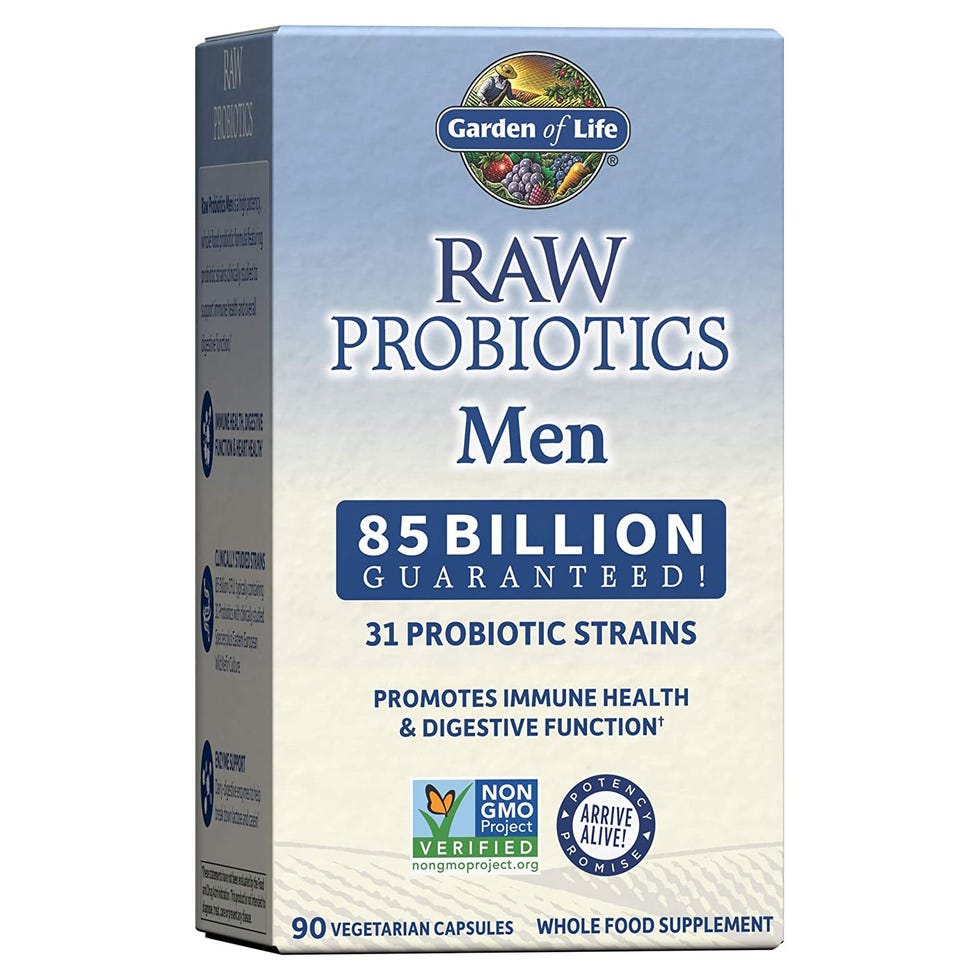
4
BEST PROBIOTIC FOR MEN
Garden of Life Raw Probiotics Men
Now 17% Off
$43 AT AMAZONCREDIT: GARDEN OF LIFE
PROS
- High potency
- Soy-free
- Vegetarian
- No binders or fillers
CONS
- Refrigeration required
Men, meanwhile, can benefit from this Garden of Life probiotic supplement; this one promotes good digestion, ideal immunity, and proper bowel movements with 85 billion CFU of 31 probiotic strains. Just be sure to refrigerate them when they arrive. “I am happy with the results so far,” one Amazon reviewer writes. “I felt supercharged with energy and felt in a great mood.”
| Form | Capsule |
|---|---|
| Dose | 3 Capsules daily |
| CFU count | 50 billion |
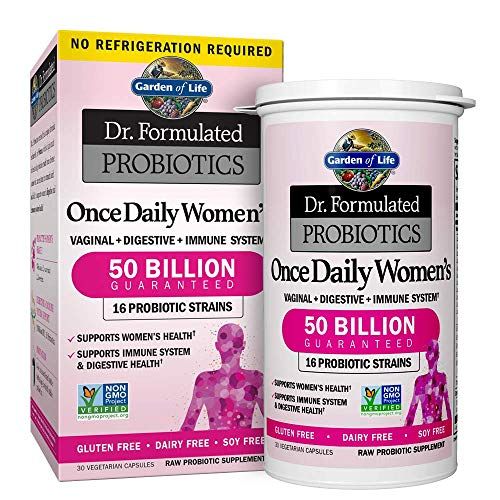
5
BEST PROBIOTIC FOR WOMEN
Garden of Life Dr. Formulated Probiotics for Women
Now 20% Off
$32 AT AMAZON$26 AT WALMART$30 AT IHERBCREDIT: GARDEN OF LIFE
PROS
- Affordable
- Offers immune, digestive, and vaginal support
- Soy-free and vegetarian
CONS
- Some users dislike the packaging
This once-daily, no-refrigeration-needed probiotic packs in 16 strains of friendly bacteria to support good digestion, boost your immune health, and support a healthy environment for vaginal flora—the total package for women. Better yet, it’s among the most popular (and highest-rated) probiotic supplements on Amazon. One reviewer even credits it with helping her resolve her lingering bacterial vaginosis.
“I struggled with recurring yeast infections, odor, bacteria, and recurring UTIs. Regardless of my good hygiene habits, I struggled everyday for the past 3 years,” one shopper writes. “I have been using this product for over a week (ONLY A WEEK!) and it has the quickest and the most effective results.”
| Form | Capsule |
|---|---|
| Dose | 1 Capsule daily |
| CFU count | 50 billion |
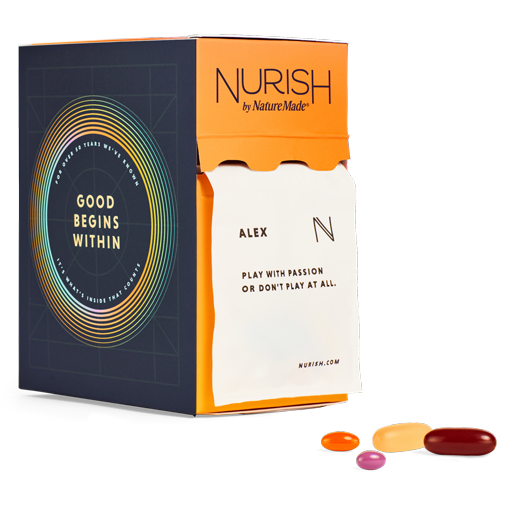
6
BEST SUBSCRIPTION PROBIOTIC
Nurish by Nature Made Multi-Strain Probiotics
$19 AT NATUREMADE.COMCREDIT: NATURE MADE
PROS
- One dose per day
- Dairy-freeVegetarian
- No color added
CONS
- Pricey
This subscription-based supplement offers 12 Lactobacilli and Bifidobacteria probiotic strains shown to support healthy gut flora. Best of all? The daily dose is just one capsule. “I like ones that you just need to take once per day,” says Largeman-Roth, who takes these probiotics herself. “It’s too much to expect people to take a supplement several times a day.” One reviewer added, “After just a few days I already notice a difference in my energy levels and my sleep at night. I’m a fan so far!”
| Form | Capsule |
|---|---|
| Dose | 1 Capsule daily |
| CFU count | 8 billion |
Advertisement – Continue Reading Below
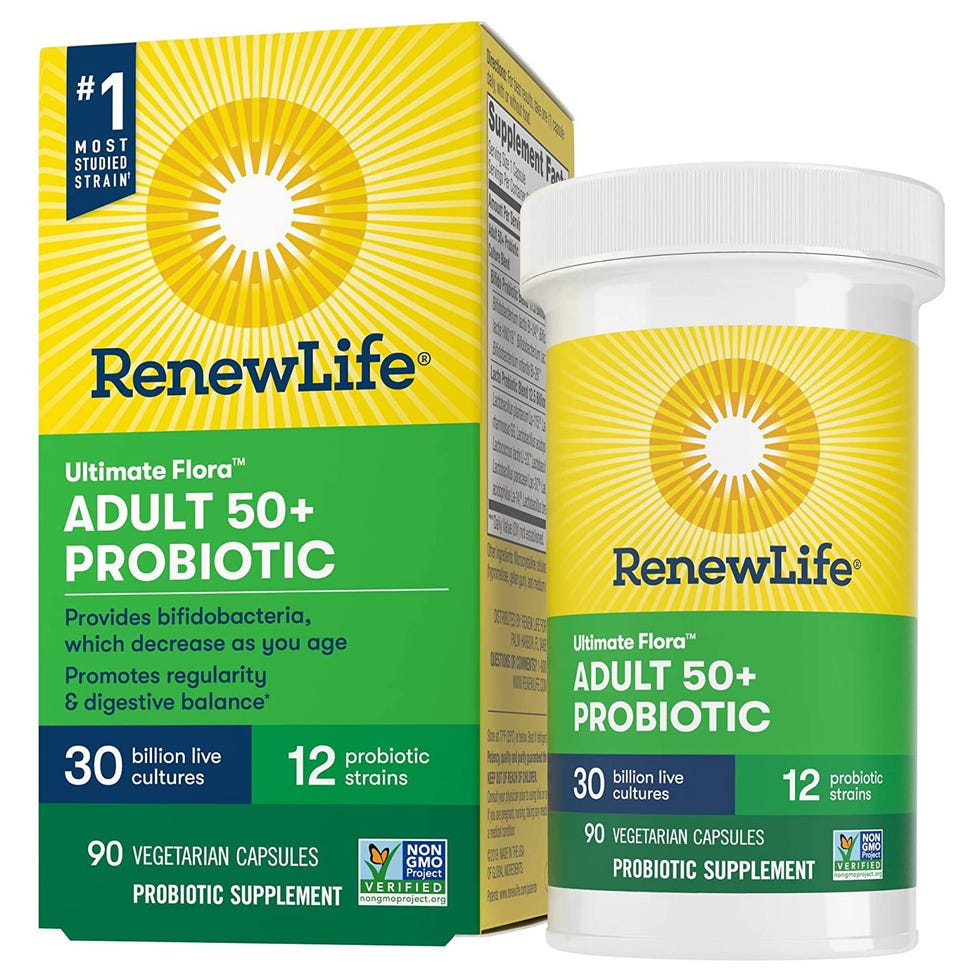
7
BEST PROBIOTIC FOR OLDER ADULTS
Renew Life Ultimate Flora Adult 50+ Probiotic
$52 AT AMAZONCREDIT: RENEWLIFE
PROS
- Great valueClinically-studied
- Gluten, dairy, and soy-free
CONS
- Slightly lower amount of live cultures
As we age, the amount of Bifidobacterium species in our gut decreases, per a 2017 study—but this supplement is designed to fight back. Formulated with 30 billion CFU of Bifidobacteria strains (plus a healthy dose of key Lactobacilli strains, too), it’s especially helpful for older adults. “My body is stronger, I am more focused on things I do during the day, and I am in a better mood,” one reviewer reports.
| Form | Capsule |
|---|---|
| Dose | 1 Capsule daily |
| CFU count | 30 billion |
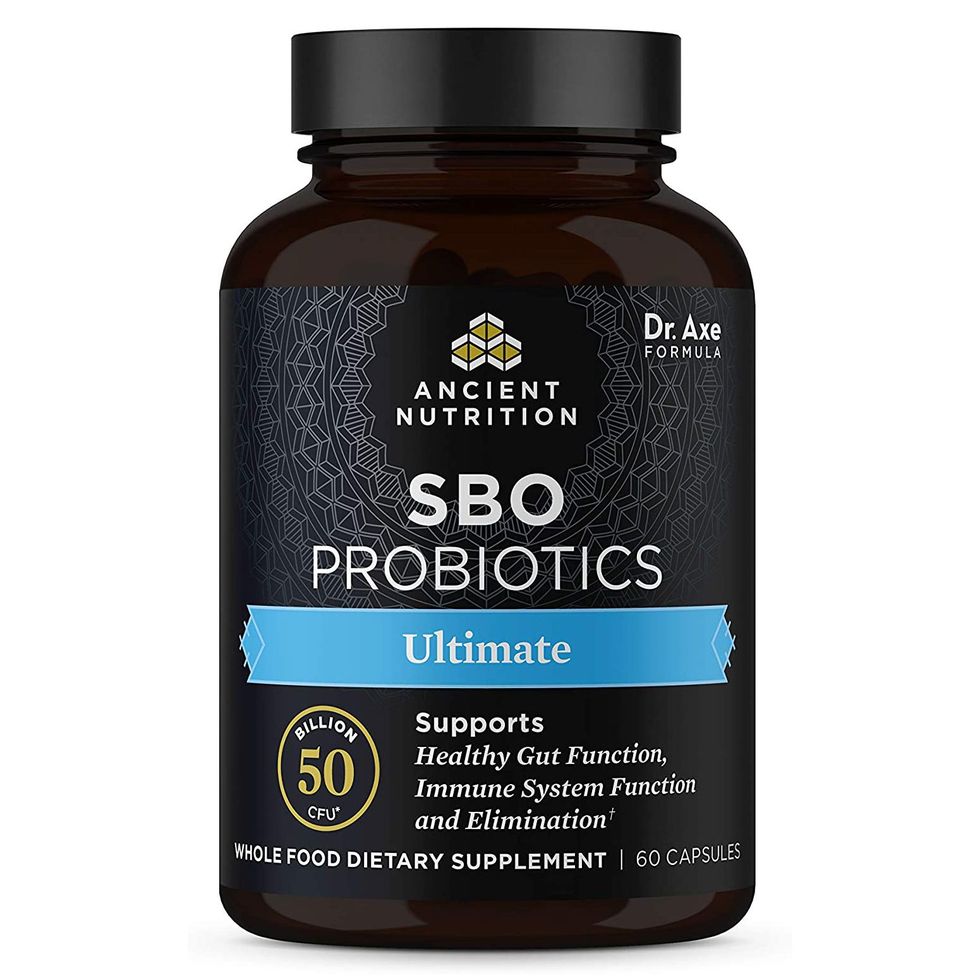
8
BEST PROBIOTIC WITH BONUS INGREDIENTS
Ancient Nutrition SBO Probiotics Ultimate
$44 AT AMAZONCREDIT: ANCIENT NUTRITION
PROS
- Contains adaptogenic herbs
- Shelf-stable
- Formulated for gut and immune support
CONS
- Two daily doses recommended
With 50 billion CFU of Saccharomyces bouldardii and three strains of Bacillus microorganisms, this probiotic’s ingredients list stands out from the competition. Another big bonus is its fermented botanical blend, which includes black pepper, ginger root, and turmeric root to further support digestion. “My entire digestion works better taking these,” says one Amazon reviewer who used these supplements to treat small intestinal bacterial overgrowth.
| Form | Capsule |
|---|---|
| Dose | 2 Capsules daily |
| CFU count | 50 billion |
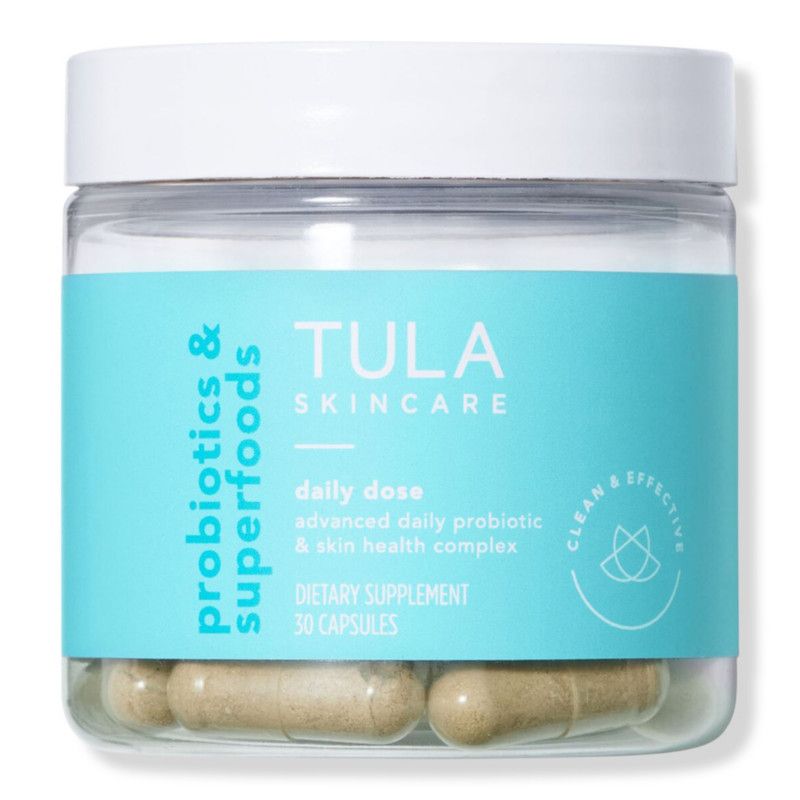
9
BEST PROBIOTIC FOR SKIN HEALTH
Tula Daily Dose Advanced Daily Probiotic & Skin Health Complex
$44 AT ULTA BEAUTYCREDIT: TULA
PROS
- Multi-beneficial
- Provides boost of antioxidants
- Formulated by gastroenterologist
CONS
- Pricey
The combo of Lactobacillus strains, Bifidobacterium strains, vitamin C, and ceramides in this probiotic supplement work to balance your gut—and help your skin look its best. “They’re clinically proven to help improve skin smoothness, firmness, and hydration,” says Dr. Rajapaksa, who formulated the probiotics herself. “Now, starting my fourth month of these supplements, I can definitely recommend them to anyone,” one Amazon reviewer writes.
| Form | Capsule |
|---|---|
| Dose | 1 Capsule daily |
| CFU count | 10 billion |
Advertisement – Continue Reading Below
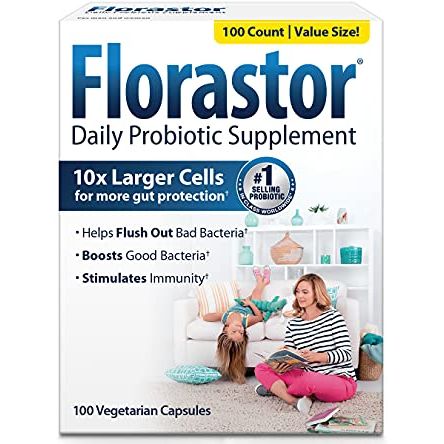
10
BEST FOR PROBIOTIC FOR IMMUNITY
Florastor Daily Probiotic Supplement
$63 AT AMAZONCREDIT: FLORASTOR
PROS
- Stimulated immunity
- Not antibiotic-resistant
- Value size
CONS
- Expires quicker than others
- CFU count not disclosed
Another favorite of Dr. Rajapaksa’s, this supplement contains a unique probiotic blend that includes Saccharomyces boulardii to balance digestion and support immune health. Bonus: They don’t need to be refrigerated. And although the price tag seems high, the package contains 100 supplements, meaning it’s actually a steal. “I feel like the old me!” one Amazon reviewer raves. “No more bloat, no more GI issues, digestion is exactly how it was before I got sick.”
| Form | Capsule |
|---|---|
| Dose | 2 Capsules daily |
| CFU count | Not disclosed |
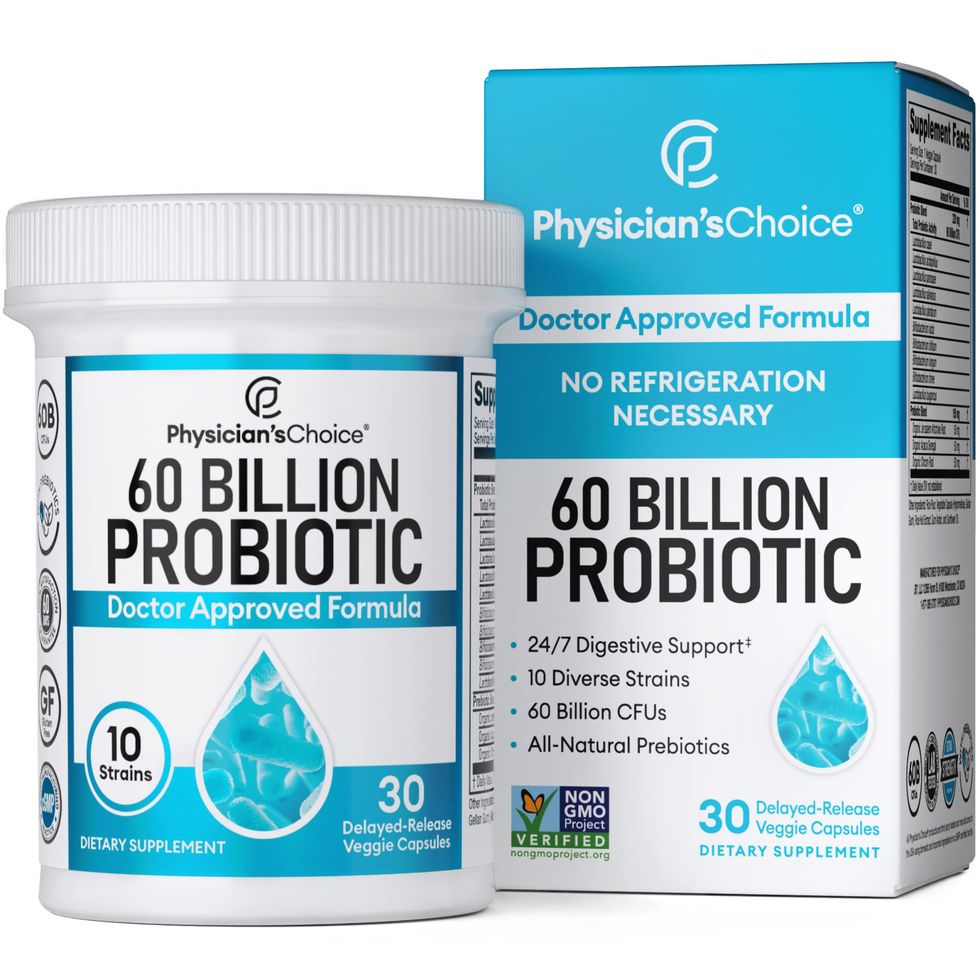
11
BEST REVIEWER-LOVED PROBIOTIC
Physician’s Choice Probiotic
Now 12% Off
$22 AT AMAZON$22 AT WALMARTCREDIT: PHYSICIAN’S CHOICE
PROS
- Contains both probiotics and prebiotics
- Does not need to be refrigerated
- Vegetarian capsules
CONS
- Some reviewers dislike the taste
These probiotics are a best seller on Amazon with over 16,000 five-star reviews calling the product “high-quality” and “magical.” It’s formulated with a blend of six Lactobacillus strains and four Bifidobacterium strains, as well as prebiotics. One five-star reviewer on Amazon calls this probiotic “an excellent value for the price and has made a significant difference in my overall health and well-being.”
| Form | Capsule |
|---|---|
| Dose | 1 Capsule daily |
| CFU count | 60 billion |
How to choose the best probiotic supplement

Choose the right bacteria. General-use supplements should contain well-researched strains; Lactobacillus, Bifidobacterium, and Saccharomyces boulardii have been studied the most, Dr. Rajapaksa says. If you’re trying to address a specific health concern, seek out a probiotic that’s been studied for that issue. Ask your doctor about strains that have been shown to be particularly helpful. Plus, be sure you’re getting enough: There’s no official recommendation for how many CFUs, or colony-forming units, you need, but most supplements contain between five and 10 billion per dose.
Look for a few key extras. A good supplement has time-release technology and delivers a dose of prebiotics—fibers that act as food for probiotic bacteria. “The time-release technology ensures the probiotic reaches your intestine and the prebiotic component aids in absorption,” says Dr. Rajapaksa. Another important extra is third-party certification; seek out a seal of approval from groups like Consumer Lab, NSF International, or the U.S. Pharmacopeial Convention (USP), which ensures the product has been tested for quality, purity, potency, and ingredients.
Make sure it’s stored correctly. A supplement doesn’t necessarily have to be refrigerated in order to be legitimate. “If the product was freeze-dried, it’s heat stable and can be stored at room temperature,” Largeman-Roth says. But if you’re buying a probiotic that’s labeled as heat-dried, it definitely needs to be kept cold. “Make sure that it was stored properly at the store,” she notes. Finally, take a look at the use-by date to confirm that you’ll be able to use up the bottle before it expires.
Advertisement – Continue Reading Below
What are probiotics?

Probiotics are live bacteria and yeast found in foods or supplements that promote healthy or “good” gut bacteria, says Melissa Prest, D.C.N., R.D.N., national media spokesperson for the Academy of Nutrition and Dietetics and member of the Prevention Medical Review Board. “Probiotic-rich foods could include yogurt, kefir, cottage cheese, sauerkraut, or kimchi.”
Benefits of taking probiotics

Probiotics can improve your health in more ways than one. Here are a few benefits that have been backed by research:
- Helps restore gut health after antibiotics. Probiotic supplements can “restore the balance of good bacteria in the gut” after taking antibiotics, says Largeman-Roth.
- Aids in digestive health. Evidence suggests probiotics play a role in improving digestion.
- Boosts immunity. Probiotic use may also help promote a stronger immune system to help fight off disease.
- May help combat mood disorders. Some studies show that probiotics can aid in mental health disorders like depression due to the link between gut health and mental health.
According to the Cleveland Clinic, some conditions that could be improved with increased probiotics include:
- Diarrhea
- Constipation
- Inflammatory bowel disease (IBD)
- Irritable bowel syndrome (IBS)
- Yeast infections
- Urinary tract infections
- Gum disease
- Lactose intolerance
When is the best time to take probiotics?

Once you find the probiotic that’s best for you, you might wonder how to use it most effectively—including taking it at the best time of day. “Research has found probiotic supplements to be most effective when taken 20 to 30 minutes before a meal,” Stephanie Nelson, M.S., R.D., MyFitnessPal nutrition scientist, previously explained. “Taking them before breakfast may be the preferred option, because your digestive system has been at rest for an extended period of time and the probiotic has less resistance reaching the intestines.”
Advertisement – Continue Reading Below
Do you need a probiotic supplement?

Anyone can regularly consume foods high in probiotics for a healthy gut and probiotics are recommended for people who have gut issues, says Prest.
When it comes to supplements, one of the most common reasons to take a probiotic is because you are experiencing digestive issues, says Keri Gans, M.S., R.D., registered dietitian and author of The Small Change Diet. “Individuals with chronic gas, bloating, constipation, or diarrhea may benefit from a probiotic, however they should consult with their primary care physician, gastroenterologist, or registered dietitian first,” Gans explains. Probiotics are helpful for bowel regularity, particularly for loose or runny stools, adds Prest.
Another reason a person may wish to start on a probiotic is to help maintain their immune health, says Gans. “There is research to support that daily use of probiotics may be beneficial for our systemic immune response,” she notes.
If you are experiencing significant health issues or worrisome symptoms, it’s best to schedule a visit with a healthcare professional to determine if probiotics are appropriate for you, as well as the type and dosage.
Should you take a probiotic when taking an antibiotic?

It depends on the antibiotic and the timing of taking the probiotic, says Prest. “Always talk with a pharmacist and your healthcare provider about probiotics you currently take or want to take when prescribed an antibiotic.”
What is the most effective probiotic?

When treating a specific health condition, there may be a particular probiotic strain that is most effective, says Prest. “Your provider and a registered dietitian nutritionist can guide you on which probiotic is best to help with a specific health condition.”
Advertisement – Continue Reading Below
Is it safe to take a probiotic every day?

It’s best to talk to your healthcare provider before taking any new supplement to ensure it works for you and your current regimen.
When to see a doctor about probiotics

If you experience any significant health issues or experience side effects after starting a probiotic, like bloating, vomiting, or diarrhea, it is best to seek medical care right away. Your doctor can help determine the root cause of your symptoms, and let you know if you continue the use of your probiotic.
How we chose the best probiotics

We spoke to Keri Gans, M.S., R.D., registered dietitian and author of The Small Change Diet; Frances Largeman-Roth, R.D.N., a New York City-based nutrition expert; Melissa Prest, D.C.N., R.D.N., national media spokesperson for the Academy of Nutrition and Dietetics and member of the Prevention Medical Review Board; and Roshini Rajapaksa, M.D., a gastroenterologist with NYU Langone Health. We also combed through countless ratings and reviews to find the best probiotics available.